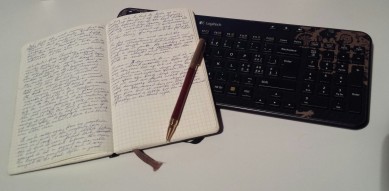Enclosed space behavioural patterns, what’s it called, lift behaviour? The doors close on two people who only seconds before were having a friendly chat over an espresso in the hotel bar. Now they shut up shop and silence ensues when the doors close like a pair of folded arms. The will to wish the lift to rise is strong and the relief is almost tangiable when it arrives. It seems like the lift and its occupants are holding their breath and finally let it out when the doors open, when those arms unfold. It’s a unique situation, it doesn’t happen when four people are squashed into a car. Space. We thrive on it.
Space conservation happens on trains. Four seats and only one of them occupied, their occupant relaxed and probably reading, playing Candy Crush or possibly, Heaven forbid, writing, with a pen and paper. A second person arrives and sits down opposite, diagonally anyway. A shuffling of feet and space, reluctantly, is conceded. This is still bearable. The first occupant continues as before; reading, Candy Crushing or maybe writing. The new arrival starts to rummage in his bag and out comes a book, a phone or maybe a pen and paper. Two people sitting diagonally can share the same space comfortably; they may even swap greetings – sometimes it still happens. This sense of conviviality continues, each to their own doing what they’re doing with possibly the occasional glance out the window, looking at the black and white cows in the fields. Why are all the cows black and white when seen from the window of a train? Where are the other cow colours? Is there a law that says only black and white cows can graze near railway lines?
Then the train pulls into the next station. Both occupants look up from what they’re doing, look at the seats next to them, move their bags half an inch nearer their feet and wait. They hold their breath. Time doesn’t stand still but they wish it would; they want to remain with an empty seat next to them forever. They don’t want their space encroached upon but they know it’s going to happen, it has to.
The doors of the train open with a swoosh and people file in, looking for a seat, any seat. It doesn’t matter next to who, they just want to sit down, to have their own place where they can sit and read a book, play the telephone or possibly write. The two original occupants frown, engage in more feet shuffling and move their bags another half an inch to see if that is enough. If not they will sigh, sometimes audibly, and rearrange their space; four seats, four people. With space dramatically reduced the original occupants will have to get used to it. The two new arrivals on the other hand are happy as Larry. They have their seat and now they can relax, coat off and a big, happy sigh of relief and out come the books, phones or pen and paper. They’re on holiday, look at them! Any more relaxed and they’d put their feet up and ask the ticket inspector for a pina colada. The two original occupants are most certainly not on holiday and have been thrown back into winter, because it’s darker now the light from the windows has diminished. The book is harder to read, Candy is harder to crush and the thoughts transmitted from pen to paper are harder to come by. Love thy neighbour, but only if you have the space to do so.
